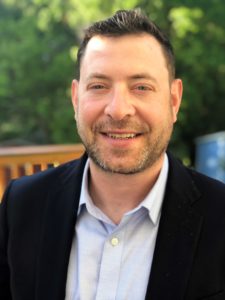Posted: September 17, 2019
Author: Wallace editorial team
National Summer Learning Association CEO Aaron Dworkin on making summer a time of opportunity for kids, adults and communities
 My high school basketball coach used to say, ‘No one gets better once the season starts. If you really want to get better, you put in time and effort over the summer.’” Aaron Dworkin took that lesson to heart. In June, he was named chief executive officer of the National Summer Learning Association (NSLA), which helped put summer on the map as a time for young people to sharpen their academic skills and discover new interests. Dworkin, a veteran of the nonprofit youth development field, is stepping into his new role at an exciting time for NSLA. The organization recently celebrated its 25th anniversary and is preparing to move its headquarters to Washington, D.C., where it will seek to persuade policymakers that providing a high-quality summer learning experience to every child is, in Dworkin’s words, “something we can cross off America’s to-do list.”
My high school basketball coach used to say, ‘No one gets better once the season starts. If you really want to get better, you put in time and effort over the summer.’” Aaron Dworkin took that lesson to heart. In June, he was named chief executive officer of the National Summer Learning Association (NSLA), which helped put summer on the map as a time for young people to sharpen their academic skills and discover new interests. Dworkin, a veteran of the nonprofit youth development field, is stepping into his new role at an exciting time for NSLA. The organization recently celebrated its 25th anniversary and is preparing to move its headquarters to Washington, D.C., where it will seek to persuade policymakers that providing a high-quality summer learning experience to every child is, in Dworkin’s words, “something we can cross off America’s to-do list.”
We talked to Dworkin about the journey that got him where he is today, how the conversation about summer learning has changed over time, and the work NSLA is doing now.*
How did you get interested in youth development? How has your background prepared you for this new position?
I’ve always been passionate about education and closing opportunity gaps. As a young person, I was in a range of schools and settings where I saw what some kids had and some didn’t. When you see that, it stays with you. I had a great appreciation for the opportunities I was given and a great commitment to making sure all young people have similar opportunities. I started a youth leadership program in New York City called Hoops and Leaders to recruit mostly men of color to be big brothers and mentors to teenage boys. That led me to study education and public policy formally at Harvard and Columbia, where I learned more about the broader nonprofit and education landscape. When I was a grad student, I was part of the team that helped start a sports-based youth development coalition called Up2Us Sports, which focuses on training youth sports coaches in youth development. I gained a national perspective to go with my local grassroots experience, and all that brought me to Arnold Schwarzenegger’s charity After-School All-Stars, first as their inaugural national program director and then as president of their national network of 20 chapters. When I was at After-School All-Stars, we created and scaled lots of different summer learning programs. They were great for the for kids but doubled as terrific professional development for staff. Summer has always been one of these spaces where you can innovate and partner more to better serve kids and communities.
How is NSLA helping organizations connect their priorities to summer learning?
In the American education system, we make a commitment to kids from September to June. Then, you get to summer, and I’m not going to say it’s the wild west, but it’s a quarter of the school year, and some kids are going to camp and museums and traveling and learning around the world, while too many have little or nothing to do besides sitting on the couch or looking at their phone. There’s research to prove that over the summer months low-income students fall behind academically. They’re not as physically active, they gain weight and eat less healthily. They may not have access to meals.There are safety issues. And the effects of this are cumulative from summer to summer.
So we partner with lots of different organizations, from funders like The Wallace Foundation to school districts, libraries, housing authorities, parks and recreation centers, nonprofits and CBOs. We want to make sure they have whatever evidenced-based resources they need, whether it’s staff training, best practices for running a program, or research so they’re able to make the case locally that this matters. We work with people to draft legislation. We have a national conference every year with 500 to 700 education leaders. We also give national recognition to model programs with our Excellence in Summer Learning Awards, which are very rigorous. Hundreds of groups apply every year, and we only honor three to four programs as examples of what’s possible.